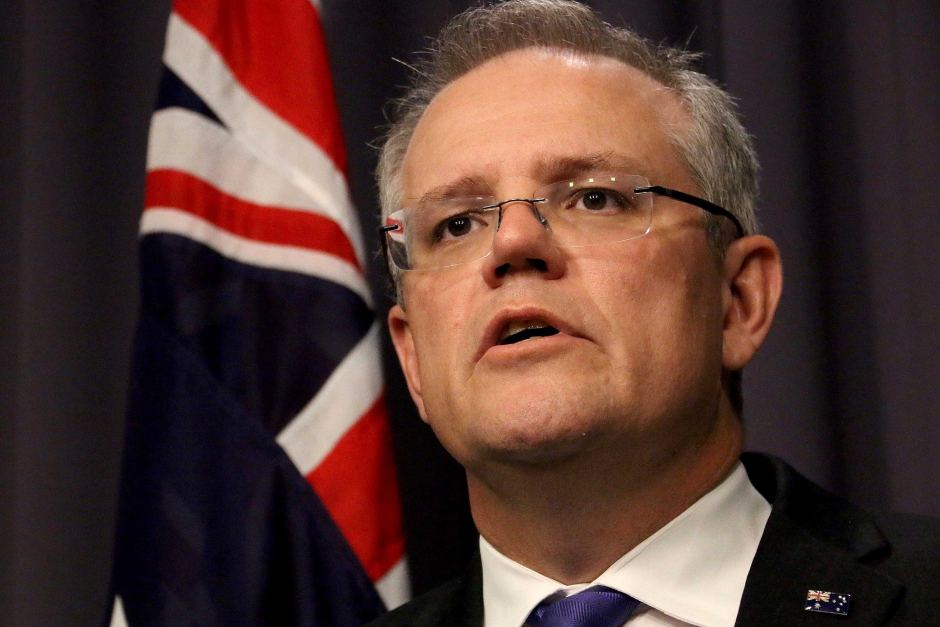Category: Economic Trends / Federal Government / Budget
Morrison confirms there will be tax hikes in federal budget
Thursday, 14 Apr 2016 09:18:17 | Michael Janda

Mr Morrison has said his focus would be on spending cuts to repair the budget deficit. (ABC: Tim Stevens - file photo)
Treasurer Scott Morrison has admitted there will be tax increases in the budget, after Moody's warned spending cuts alone would not safeguard Australia's AAA credit rating.
Key points:
- Moody's analysts warn spending cuts are unlikely to get Australia's budget back in the black over the next five years
- Treasurer says there "will be revenue measures in the budget" but will use the money raised in "reducing the tax burden" elsewhere
- Government debt forecast to rise to 38 per cent of GDP by 2018, threatening AAA credit rating
In its latest note on the credit implications of current events, Moody's cited last Friday's announcement by Mr Morrison that his focus would be on spending cuts, not tax increases, to repair the budget deficit.
Moody's analysts Marie Diron and Matthew Circosta warned that tax increases are likely to be necessary to get the budget back in the black within five years.
"Without such measures, limited spending cuts are unlikely to meaningfully advance the Federal Government's aim of balanced finances by the fiscal year ending June 2021 and Government debt will likely continue to climb, a credit negative for Australia," they said.
While not putting Australia on a negative credit rating watch — the immediate warning for a potential downgrade — the note is a shot across the Government's bows by Moody's ahead of the May 3 budget.
However, at a press doorstop after the Moody's note was released, Mr Morrison did point towards the potential for some tax increases, or tax concession reductions, in the budget.
"It's not to say there won't be revenue measures in the budget, of course there will be revenue measures in the budget," he said.
"But what we're saying is where we will apply those revenue measures is to reducing the tax burden in other parts of the economy."
 Infographic:
Australia's debt trajectory is taking it into dangerous territory for the credit rating.
Infographic:
Australia's debt trajectory is taking it into dangerous territory for the credit rating.(Moody's)
That may not satisfy Moody's, whose analysts warned that tax increases are needed to raise extra revenue, given the political challenges of getting substantial spending cuts through Parliament.
"Given previous difficulties in reducing welfare benefits, actual spending cuts may be modest," the analysts cautioned in their note.
'Wake-up call' for the Government
Shadow treasurer Chris Bowen has described the assessment as a "wake-up call" for Mr Morrison.
"Losing the AAA credit rating would mean that Australia pays more in interest, it will be a blow to confidence and would have flow-on effects to the ratings of major corporate entities in Australia," Mr Bowen warned.
"This year's budget deficit has blown out by $33 billion. Debt's $100 billion higher than it was at the last election."
Employment Minister Michaelia Cash defended the Government's position.
"It is in our DNA to focus on lowering taxes. That is what a Coalition government is all about," she said.
"We are focused on less spending, more responsible spending, and lowering taxes with a very clear distinction in term of what a Labor government, if one was elected, would offer."
The Treasurer said expenditure would continue to fall to about 25.3 per cent of GDP and revenue was forecast to rise to 24.1 per cent of economic output next year, its long run average.
"Our revenue measures that we announce in the budget and the redeployment of that revenue to easing the tax burden where you can foster investment is the way we believe that you can drive growth and jobs in this economy," Mr Morrison added.
Debt could reach 38 per cent GDP by 2018: Moody's
Moody's points to Australia's government debt more than trebling as a proportion of GDP to 35.1 per cent by the 2015 financial year.
It forecast that debt would rise to 38 per cent of GDP by 2018, which would bring it very close to the median of AAA-rated countries, around 40 per cent.
If debt continued to grow from there, that would put Australia's coveted AAA rating under serious threat of a downgrade.
The Moody's analysts lamented the absence of tax changes as part of the budget policy mix, and warned that modest superannuation reforms alone would not be sufficient to balance the budget.
"Fading prospects for tax reform present challenges to boosting government revenues at a time when lower commodity prices are weighing on receipts from corporate profits and income taxes," the analysts wrote.
"Changes to superannuation tax concessions are still on the agenda and will raise government revenues, but they will be insufficient in achieving a balanced budget within five years."
Specifically, Moody's noted the shelving of a possible GST increase to 15 per cent that would have raised $35 billion, and the Government's opposition to Labor's negative gearing and capital gains tax proposals which are predicted to improve the budget position by $32 billion over a decade.
- About Us
- |
- Terms of Use
- |
-
 RSS
RSS - |
- Privacy Policy
- |
- Contact Us
- |
- Shanghai Call Center: 962288
- |
- Tip-off hotline: 52920043
- 沪ICP证:沪ICP备05050403号-1
- |
- 互联网新闻信息服务许可证:31120180004
- |
- 网络视听许可证:0909346
- |
- 广播电视节目制作许可证:沪字第354号
- |
- 增值电信业务经营许可证:沪B2-20120012
Copyright © 1999- Shanghai Daily. All rights reserved.Preferably viewed with Internet Explorer 8 or newer browsers.




 Send to Kindle
Send to Kindle